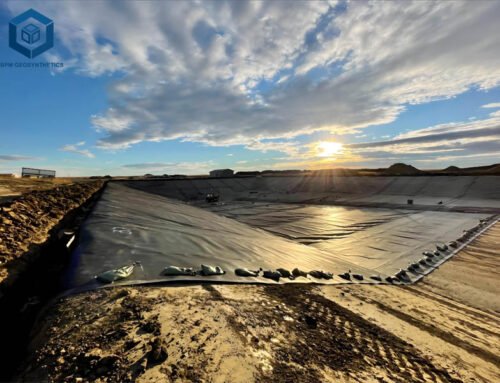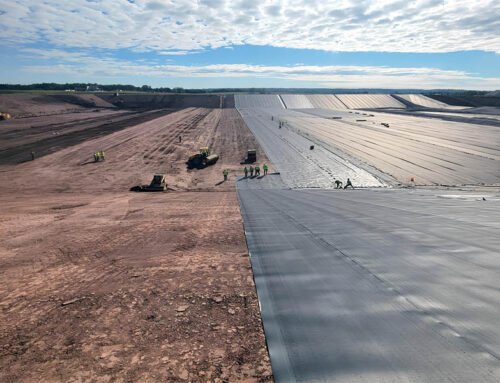China Geomembrane refers to geomembrane made in China. Selecting the best China geomembrane or Geomembrana China is pivotal for ensuring the success and durability of various engineering endeavors. This comprehensive guide offers invaluable insights into the intricate process of making the optimal choice. From delving into the fundamentals of geomembranes to meticulously considering diverse engineering requirements, this guide navigates through critical aspects such as waterproofing performance, corrosion resistance, and aging resilience. Emphasizing the significance of manufacturer reputation, material testing, and quality assurance systems, it underscores the importance of reliability and consistency in geomembrane selection. Furthermore, by addressing factors related to installation ease, maintenance costs, and environmental impact, this guide empowers decision-makers to make well-informed choices that prioritize project quality and sustainability. With practical recommendations, expert insights, and a commitment to excellence, this guide serves as an indispensable resource for engineers, construction professionals, and researchers striving to elevate the standards of civil engineering practices in China and beyond.
1. What Is China Geomembrane?
China geomembrane, also referred to as geomembrane China, is an extensively utilized waterproof material in civil engineering that plays a vital role in ensuring the quality of engineering projects. It is a synthetic material employed in various civil and environmental engineering applications for containment, lining, and barrier purposes. Its primary function is to create impermeable barriers, preventing the migration of fluids and gases and thus safeguarding the environment from contamination while maintaining the structural integrity of engineering works.
Geomembranes in China are typically made from polymers like high-density polyethylene (HDPE), low-density polyethylene (LDPE), polyvinyl chloride (PVC), polypropylene (PP), and ethylene propylene diene monomer (EPDM). These materials are available in different thicknesses, compositions, and configurations to suit diverse project requirements.
China geomembranes possess several advantages beyond their impermeability. They are known for their durability, flexibility, and chemical resistance, enabling them to withstand harsh environmental conditions, including UV radiation, temperature fluctuations, and chemical exposure. Moreover, they offer ease of installation, cost-effectiveness, and adaptability to various terrains and site conditions. Depending on project specifications and site requirements, geomembranes can be installed using techniques such as welding, adhesive bonding, and mechanical anchoring.
In modern engineering practices, China geomembranes play a critical role, providing effective solutions for containment, environmental protection, and resource management challenges. With advancing technology and increasing emphasis on sustainability, geomembranes continue to evolve, offering innovative solutions for a wide range of engineering applications.


2. Understanding the Basic Performance of China Geomembrane
Before selecting a geomembrane, it is essential to understand its basic performance. Geomembranes primarily exhibit the following characteristics:
2.1 Waterproof Performance
China geomembrane possesses excellent waterproof performance, effectively preventing the infiltration of water.
2.2 Corrosion Resistance
China geomembrane materials demonstrate good corrosion resistance, maintaining stable performance in various environments.
2.3 Aging Resistance
Geomembranes exhibit good aging resistance, maintaining satisfactory performance over long-term usage.
2.4 Mechanical Strength
Geomembranes have a certain level of tensile strength and tear resistance, capable of withstanding external forces.
Understanding these basic performance characteristics allows engineers and project managers to make informed decisions when selecting geomembranes for specific applications. By considering factors such as project requirements, site conditions, and performance specifications, the most suitable geomembrane can be chosen to ensure the success and longevity of the engineering project.
3. Considering Engineering Requirements When Choosing China Geomembrane
When selecting a China geomembrane, it is essential to consider the actual engineering requirements. This includes the following aspects:
3.1 Engineering Environment
Understand the environmental factors such as climate, soil, and groundwater level at the project site, and choose geomembrane materials that are suitable for these conditions.
3.2 Engineering Specifications
Based on the project’s requirements for waterproofing, corrosion resistance, aging resistance, etc., select China geomembrane materials that meet these specifications.
3.3 Engineering Scale
Depending on the size of the project, select China geomembrane materials of appropriate specifications to meet the engineering requirements.
By carefully considering these engineering requirements and evaluating the specific needs of the project, engineers and project managers can select the most suitable geomembrane materials to meet performance, durability, and regulatory compliance requirements. This ensures the successful implementation and long-term performance of geomembrane-based engineering solutions.
4. Paying Attention to the Quality of China Geomembrane
Quality is a crucial factor when selecting geomembranes. High-quality geomembrane materials ensure the quality and safety of the engineering project. Therefore, when choosing geomembranes, it is essential to consider the following aspects:
4.1 Manufacturer Reputation
Choose a manufacturer with a good reputation to ensure the reliability of the purchased geomembrane materials. BPM Geosynthetics is the leading China geomembrane manufacturer and supplier, we offers quality smooth geomembrane and textured geomembrane made of virgin material.
4.2 Material Testing
Conduct necessary material testing before purchasing geomembrane materials to ensure that the material properties meet the engineering requirements. BPM Geomembrane has its own material testing center.
4.3 Quality Assurance System
Understand the manufacturer’s quality assurance system to ensure that the purchased geomembrane materials undergo strict control during the production process. BPM geomembrane factory is certificated by ISO9001, ISO14001, and OHSAS18001. All BPM geomembranes have passed the certificates of the TUV, Soncap, SASO, BV and the test of SGS and Intertek etc.
By paying close attention to the quality of geomembranes and selecting products from reputable manufacturers with a commitment to quality, engineers and project managers can mitigate risks, ensure project success, and achieve long-term performance and durability in engineering applications.


5. Considering Geomembrane Installation and Maintenance
When selecting China geomembrane, it is also essential to consider factors related to installation and maintenance. This includes the following aspects:
5.1 Ease of Installation
Choose geomembrane materials that are easy to install to improve construction efficiency and quality.
5.2 Maintenance Costs
Consider the service life and maintenance costs of geomembrane materials, and choose materials that offer high cost-effectiveness.
5.3 Environmental Friendliness
When selecting geomembrane materials, it is also necessary to consider their environmental performance and choose materials with minimal environmental impact.
By considering these installation and maintenance factors alongside geomembrane selection, engineers and project managers can optimize the performance, durability, and cost-effectiveness of geomembrane systems in various engineering applications. A proactive approach to installation and maintenance can help mitigate risks, extend the service life of the geomembrane system, and enhance overall project success.
6. Conclusion and Recommendations
Selecting suitable geomembrane materials is crucial for ensuring the quality of engineering projects. During the actual selection process, it is essential to thoroughly understand the basic performance of geomembranes, consider engineering requirements, focus on quality, and take into account factors related to construction and maintenance. Furthermore, it is recommended to enhance research and application of geomembrane materials in practical engineering projects continuously, aiming to improve their performance and quality, thereby making greater contributions to the development of civil engineering.
When choosing geomembranes, the following points should also be noted:
6.1 Understand Engineering Requirements
Before selecting geomembranes, it is necessary to fully understand the engineering requirements, including project scale, environmental conditions, and waterproofing requirements. Only by comprehensively understanding the engineering requirements can the most suitable geomembrane materials be selected.
6.2 Seek Professional Advice
When selecting geomembranes, consulting with professionals such as civil engineers and material experts is advisable. They can provide suitable recommendations based on engineering requirements and professional experience.
Consider Material Compatibility: When choosing geomembranes, it is important to consider their compatibility with other materials used in the project. For example, in some cases, geomembranes may need to come into contact with concrete, soil, etc. Therefore, it is essential to ensure that there are no chemical reactions or performance degradation between them.
Evaluate Cost-effectiveness: When selecting geomembranes, it is crucial to evaluate their cost-effectiveness. Although high-quality geomembrane materials may have higher prices, their longer service life and better performance usually result in better cost-effectiveness in the long run.
In conclusion, selecting the appropriate geomembrane material requires consideration of multiple factors. By understanding the basic performance of geomembranes, focusing on engineering requirements and quality, considering construction and maintenance aspects, and paying attention to key points, you can better choose geomembrane materials suitable for your project. In practical applications, adjustments and optimizations should be made based on specific circumstances to ensure the quality and safety of the engineering project.
Any questions or inquiries, please contact us.






Leave A Comment